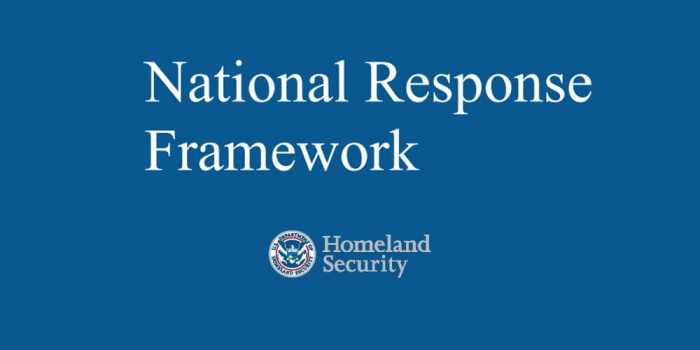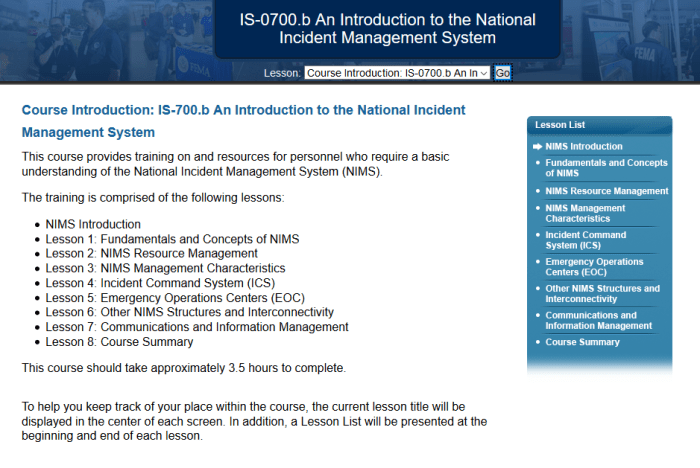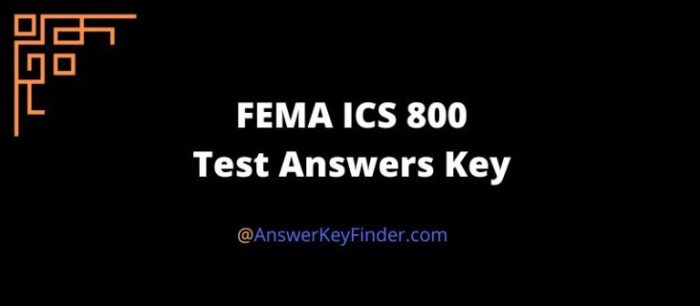Fema is 800 final exam answers – Embark on a journey of knowledge with FEMA IS-800 Final Exam Answers, your ultimate companion to ace the exam and excel in incident management. This comprehensive guide delves into the intricacies of the exam, equipping you with a thorough understanding of key concepts and strategies.
As you navigate through the chapters, you’ll uncover the exam structure, master fundamental principles, and gain practical insights into the incident management process. From communication and coordination to resource management, every aspect is meticulously covered, ensuring your success in managing real-world emergencies.
FEMA Final Exam Structure

The FEMA IS-800 Final Exam assesses your knowledge of the Incident Command System (ICS). It consists of 800 multiple-choice questions, and you have 180 minutes to complete it. The exam covers five major sections:
- Incident Command System Overview (20%)
- Incident Response (20%)
- Incident Management (30%)
- Incident Support (20%)
- Multiagency Coordination (10%)
Key Concepts and Principles
The FEMA IS-800 exam assesses candidates’ understanding of the fundamental concepts and principles that guide incident management. These include:
The National Incident Management System (NIMS) provides a standardized approach to incident management, ensuring that all responders operate under a common set of protocols and procedures.
The Incident Command System (ICS) is a flexible, scalable management structure that allows incident managers to effectively coordinate response efforts.
The Emergency Operations Center (EOC) serves as the central hub for incident management, providing a physical space for responders to coordinate and make critical decisions.
If you’re searching for fema is 800 final exam answers, consider exploring core connections algebra 2 pdf for additional resources. This comprehensive guide offers valuable insights that can enhance your preparation for the fema is 800 final exam answers.
Roles and Responsibilities
Various personnel play critical roles in incident management, each with specific responsibilities:
- The Incident Commander has overall authority and responsibility for the incident response.
- The Operations Section Chief oversees the day-to-day operations of the incident, including resource management and tactical planning.
- The Planning Section Chief develops and maintains the incident action plan, which Artikels the overall strategy and objectives for the response.
Incident Management Process

The incident management process is a systematic approach to managing incidents from notification to recovery. It ensures a coordinated and effective response to minimize the impact of incidents and restore normal operations.
The incident management process typically involves several phases, each with specific tasks and objectives:
Incident Notification
- Receive and verify the initial notification of an incident.
- Gather preliminary information and assess the potential impact.
- Activate the incident response team and establish communication channels.
Incident Response
- Take immediate actions to mitigate the impact of the incident.
- Conduct a thorough investigation to determine the root cause.
- Develop and implement a recovery plan to restore normal operations.
Incident Recovery
- Implement the recovery plan and restore normal operations.
- Monitor the recovery process and make necessary adjustments.
- Conduct a post-incident review to identify areas for improvement.
Documentation and Record-Keeping
Throughout the incident management process, it is crucial to maintain accurate documentation and records. This information provides a valuable record of the incident and the response actions taken. It also facilitates learning and improvement for future incidents.
Communication and Coordination
Effective communication and coordination are vital for successful incident management. They ensure timely information exchange, coordinated response efforts, and effective decision-making.Various methods are used for communication, including:
Radio Communication
- Provides real-time, direct communication between responders.
- Allows for immediate updates and coordination of actions.
Telephone Communication
- Used for longer-distance communication, such as between incident command and support staff.
- Enables detailed information exchange and planning.
Social Media
- Can be used to disseminate information to the public and affected communities.
- Facilitates situational awareness and enables feedback from the public.
Joint Information Systems (JIS), Fema is 800 final exam answers
JIS plays a crucial role in coordinating public information and media relations during incidents. It:
- Provides a central point of contact for media inquiries.
- Coordinates the release of accurate and consistent information to the public.
- Facilitates media access to incident responders and updates.
Resource Management: Fema Is 800 Final Exam Answers

Resource management during an incident involves identifying, requesting, and managing resources to effectively respond to the situation. These resources encompass personnel, equipment, and supplies essential for incident response.
Types of Resources
Various types of resources are available, including:
- Personnel:Trained and skilled individuals, such as firefighters, medical professionals, and engineers.
- Equipment:Tools, vehicles, and machinery required for incident response, such as fire engines, ambulances, and heavy machinery.
- Supplies:Consumables and materials necessary for incident management, such as food, water, medical supplies, and fuel.
Challenges and Best Practices
Resource management in large-scale incidents poses challenges, including:
- Limited availability:Resources may be scarce, especially during major disasters.
- Coordination difficulties:Multiple agencies and organizations may be involved, requiring effective coordination.
- Time constraints:Incidents often demand rapid response, making resource allocation time-sensitive.
Best practices for resource management include:
- Pre-planning:Establishing resource allocation plans in advance.
- Effective communication:Clear and timely communication among stakeholders.
- Prioritization:Identifying and prioritizing critical needs.
- Collaboration:Working with other agencies and organizations to pool resources.
Legal and Ethical Considerations
Incident management involves adherence to legal frameworks and ethical principles. Legal considerations encompass compliance with laws and regulations governing emergency response, such as environmental protection, public safety, and civil rights. The Incident Commander bears the responsibility of ensuring compliance with these legal requirements.Ethical
principles guide decision-making in incident management, emphasizing the duty to protect life and property. Incident responders must prioritize the safety and well-being of individuals affected by the incident, while also considering the preservation of property and the environment. Ethical considerations also include respecting the rights and privacy of individuals involved, ensuring fair and equitable treatment, and avoiding discrimination or bias in decision-making.
Role of the Incident Commander
The Incident Commander is responsible for ensuring compliance with applicable laws and regulations during incident management. This includes understanding and adhering to legal frameworks governing emergency response, such as those related to environmental protection, public safety, and civil rights. The Incident Commander must also ensure that ethical principles are upheld in decision-making, prioritizing the safety and well-being of individuals affected by the incident while considering the preservation of property and the environment.
Q&A
What is the format of the FEMA IS-800 exam?
The exam consists of 100 multiple-choice questions, with a time limit of 180 minutes.
What topics are covered in the exam?
The exam covers the following topics: Incident Management System, Incident Command System, Emergency Operations Center, Communication and Coordination, Resource Management, and Legal and Ethical Considerations.
What is the passing score for the exam?
The passing score for the exam is 70%.